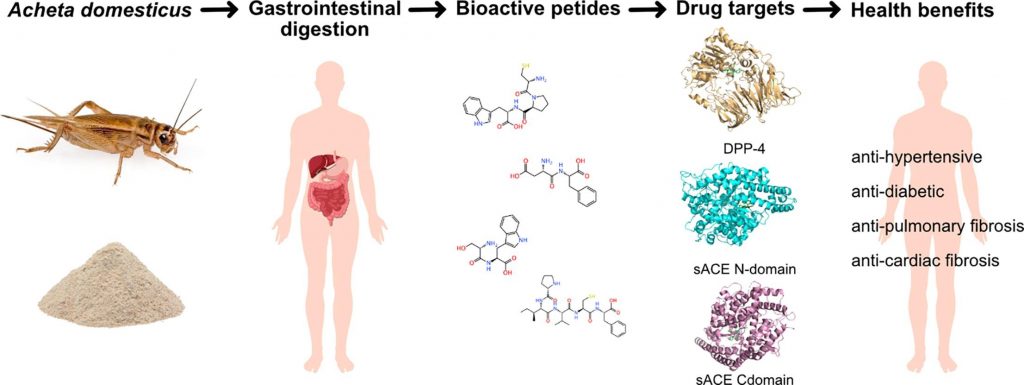Please check our recent collaborative research paper published in Food Research International (IF 7.425), a collaboration with the research group of Prof Isabel Ferreira and Prof. Isabel Mafra (REQUIMTE/LAQV – FFUP). This study focused on the human digestion of protein sources obtained from insects and on the identification of peptides derived from this process with potential bioactive properties against hypertension, diabetes, cardiac and pulmonary fibrosis.
An in silico approach to unveil peptides from Acheta domesticus with potential bioactivity against hypertension, diabetes, cardiac and pulmonary fibrosis
Carla S.S. Teixeira, Caterina Villa, Sérgio F. Sousa, Joana Costa, Isabel M.P.L.V.O. Ferreira, Isabel Mafra
Food Research Internation (2023) | DOI: 10.1016/j.foodres.2023.112847
Entomophagy is a sustainable alternative source of proteins for human nutrition. Acheta domesticus is one of the three insect species that complies with the European Union Regulation on novel foods, but to date, there are no reports on their potential bioactive peptides. In this study, an in silico approach was applied to simulate the gastrointestinal (GI) digestion of six A. domesticus proteins and identify new peptides with potential anti-hypertensive and/or anti-diabetic properties, resulting from their capability to inhibit the somatic Angiotensin-I converting enzyme (sACE) and/or dipeptidyl peptidase 4 (DPP-4), respectively. A molecular docking protocol was applied to evaluate the binding interactions between the 43 peptides ranked with high probability of being bioactive and three drug targets: DPP-4 and two catalytic domains (N- and C-) of sACE. Five peptides (AVQPCF, CAIAW, IIIGW, DATW and QIVW) showed high docking scores for both enzymes, suggesting their potential to inhibit the DPP-4 and both catalytic domains of sACE, thus possessing multifunctional bioactive properties. Two peptides (PIVCF and DVW) showed higher docking scores for the N-domain of sACE, indicating a potential action as selective inhibitors and consequently with anti-cardiac and pulmonary fibrosis bioactivities. This is the first study identifying peptides originated from the simulated GI digestion of A. domesticus with potential activities against hypertension, diabetes, cardiac and pulmonary fibrosis.

